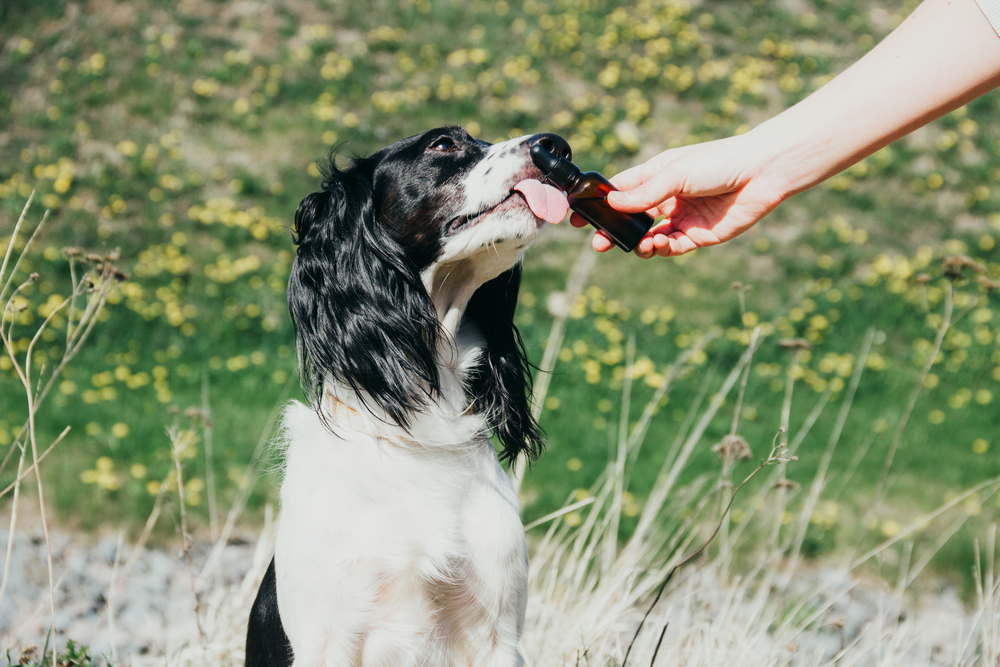7 Ways How does CBD Oil Help for Dogs with Cancer

Table of Contents
CBD oil is a natural supplement featuring hemp-sourced cannabidiol. CBD oil for dogs cancer is a natural cancer treatment for dogs. CBD is safe for dogs with cancer when used as part of a veterinarian-approved cancer treatment plan.
CBD for dogs with cancer helps fight cancer through its anti-tumor properties and the dog’s endocannabinoid system. Cannabidiol works against cancer in seven ways, including reduced tumor growth, decreased tumor spreading, cancer cell death, and tumor shrinking.
CBD for dogs is safe to combine with mainstream anti-cancer treatment. Pure, high-quality, and full-spectrum pet CBD boosts the efficacy of chemotherapy and radiation while reducing their side effects. CBD is not a miracle cure for dog cancer but it helps with treating cancer in dogs naturally. The 7 ways CBD Oil helps dogs with cancer are explained below.
1. Anti-Tumor Medication
Anti-tumor medication in animals is antineoplastic (or anti-tumor) chemotherapy and is routinely used in dogs, cats and horses. Chemotherapy uses biochemical methods of action to decrease tumor size or stage of malignancy. Chemotherapy in animals is often combined with radiation and surgery.
CBD is a potential anti-tumor medication because it acts directly against cancer. CBD impacts two important cancer-related processes: Angiogenesis and metastasis. Cannabidiol helps prevent angiogenesis and metastasis, thus working as an anti-tumor medication.
Angiogenesis is the process of making new blood vessels necessary for tumor growth. Metastasis is the spreading of cancer cells to other parts of the body. Angiogenesis and metastasis are critical aspects of cancer development.
The British Pharmacology Society published a study, “Cannabidiol inhibits angiogenesis by multiple mechanisms,” in 2012. The study showed the CBD’s inhibiting effect on angiogenesis in humans. The endocannabinoid system is the same in all mammals; similar effects are expected in dogs.
The National Library of Medicine released a paper titled “Pathways mediating the effects of cannabidiol on the reduction of breast cancer cell proliferation, invasion, and metastasis” in 2010. The study showed the CBD’s positive effect on impeding metastasis.
2. Reduce Inflammation and Pain
Reducing inflammation and pain are two ways that CBD oil benefits dogs with cancer. Inflammation in the organs and tissues that are damaged by cancer in dogs results in discomfort and pain. It has been discovered that CBD (cannabidiol) contains anti-inflammatory qualities, which implies it aids in lowering inflammation in the body.
The anti-inflammatory and anti-pain properties of CBD for dogs are researched and documented. Pet CBD works against inflammation on two levels, by inhibiting COX-2, which triggers inflammation, and by blocking the pro-inflammatory cytokines that support inflammation.
The first effect was shown in the study “Effect of Cannabidiol (CBD) on Canine Inflammatory Response: An Ex Vivo Study on LPS Stimulated Whole Blood,” published in 2021, and the second in the study “The Effects of Cannabinoids on Pro- and Anti-Inflammatory Cytokines: A Systematic Review of In Vivo Studies.”
CBD for dogs with cancer reduces pain by mimicking the wellness effects of the hormone serotonin and affecting the anandamide signaling.
Agatha M. Cortes, in “The role of cannabinoids in pain modulation in companion animals,” says that CBD is “an effective therapeutic alternative in the multimodal management of pain in dogs and cats.”
3. Enhance Sleep
CBD promotes relaxation and enhances sleep for dogs with cancer. CBD for dogs promotes natural calmness and relaxation, improving sleep quality and quantity.
The Permanente Journal published a human study, “Cannabidiol in Anxiety and Sleep: A Large Case Series,” 2019. The study showed that CBD reduces anxiety and supports better sleep.

The exact effect of CBD on dog sleep is not well-researched, but conclusions drawn from human studies indicate similar effects for dogs with cancer. Anecdotal reports from owners suggest that CBD enhances sleep in dogs.
4. Help with Nausea
CBD for dogs with cancer has an anti-nausea effect meaning it helps relieve nausea and suppresses vomiting. Nausea is a common adverse effect of chemotherapy in dogs with cancer.
Erin M. Rock and associates wrote a paper titled “Therapeutic Potential of Cannabidiol, Cannabidiolic Acid, and Cannabidiolic Acid Methyl Ester as Treatments for Nausea and Vomiting” in 2021.
The anti-nausea effect of CBD was demonstrated in an earlier study on rats. The study is titled “Cannabidiol, a non-psychoactive component of cannabis and its synthetic dimethylheptyl homolog suppress nausea in an experimental model with rats,” published in 2002. The study explained how CBD suppresses nausea caused by diseases, medications, and conditioned events.
A 2020 study, “Evaluation of repeated or acute treatment with cannabidiol (CBD), cannabidiolic acid (CBDA) or CBDA methyl ester (HU-580) on nausea and/or vomiting in rats and shrews,” found that animals do not develop tolerance to the CBD’s anti-nausea effect following continuous use.
5. Boost Immune System
CBD for dogs with cancer boosts the immune system and increases the natural defense mechanisms. The immune-boosting effect of CBD is essential for cancer patients because cancer tumors weaken the immune system.
Veterinary Sciences published a study, “Effect of Cannabidiol (CBD) on Canine Inflammatory Response: An Ex Vivo Study on LPS Stimulated Whole Blood,” in 2021. The study elaborated on CBD’s ability to modulate the immune system.
6. Improve Appetite
CBD Oil improves appetite in dogs with cancer. Hemp-sourced pet CBD relieves nausea and vomiting, calms the nervous system, and promotes digestive health, resulting in a better appetite.
The International Journal of Molecular Sciences published a paper, “Cannabidiol and Other Non-Psychoactive Cannabinoids for Prevention and Treatment of Gastrointestinal Disorders: Useful Nutraceuticals?” The study demonstrated the role of CBD in digestive health support.
Full-spectrum hemp CBD products for dogs feature different cannabinoids. CBD (cannabidiol) does not directly affect appetite, but CBG (cannabigerol) does. Use a full-spectrum CBD product that contains CBG to enhance appetite if your pet has cancer.
The appetite-promoting effect of CBG is shown in a study, “Cannabigerol is a novel, well-tolerated appetite stimulant in pre-satiated rats” from 2016.
7. Reduced Cell Proliferation
CBD reduced cell proliferation through apoptosis signaling. Apoptosis is pre-programmed cellular death. Normal cells undergo apoptosis, while cancer cells do not. CBD triggers apoptosis in cancer cells.
Frontiers in Veterinary Science published a study titled “Cannabidiol Induces Apoptosis and Perturbs Mitochondrial Function in Human and Canine Glioma Cells” in 2021. The study explained how CBD promotes the apoptosis of cancer cells.
A paper published in Veterinary and Comparative Oncology confirmed “The effect of cannabidiol on canine neoplastic cell proliferation and mitogen-activated protein kinase activation during autophagy and apoptosis.”
What is CBD Oil?
CBD oil is a specific type of oil featuring cannabidiol. Cannabidiol (CBD) is a phytocannabinoid, a natural compound extracted from the Cannabis sativa plant.
The term Cannabis sativa is an umbrella and includes different plants such as hemp, marijuana, and ruderalis, each with a different phytocannabinoid profile.
Cannabidiol, or CBD, is the main phytocannabinoid in hemp and accounts for 40% of its extract. CBD has health-boosting properties and is safe for animals.
Marijuana, on the other hand, contains very little CBD and high amounts of THC. THC, or tetrahydrocannabinol, is the psychoactive phytocannabinoid that makes people “high.”
A popular question among pet owners is, “What is CBD” oil for dogs. Dog CBD oil is a cannabidiol-containing oil sourced from hemp.
High-quality dog CBD oil is made from organic hemp and is extracted using a CO2 process. CBD oils for dogs come in different strengths and pet-friendly flavors.
CBD oil helps dogs fight cancer on several levels, including reducing inflammation and pain, improving sleep, and reducing the production of blood cells that spread the cancer. High-quality and pure CBD oil is one of the most popular natural ways to shrink tumors in dogs with cancer.
How Can CBD Help Fight Cancer?
CBD helps fight cancer by assisting traditional anti-cancer treatment to shrink the tumor. Cannabinoids have several anti-cancer features that help reduce the size of tumors and prevent the spread of tumor cells throughout the body.
CBD for dogs promotes apoptosis and prevents angiogenesis. Dog CBD helps fight cancer by modulating the immune system through its anti-inflammatory, anti-pain, and antioxidant properties.
CBD oil for dog cancer is an alternative treatment for pet owners wondering how to shrink a tumor in a dog naturally.
Is CBD Safe for Dogs with Cancer?
Yes, CBD is safe for dogs with cancer. Dogs with cancer tolerate CBD well and with few side effects.
The National Center for Biotechnology Information published “Single-Dose Pharmacokinetics and Preliminary Safety Assessment with Use of CBD-Rich Hemp Nutraceutical in Healthy Dogs and Cats” in 2019. The study found that CBD is safe for pets.
CBD for dogs with cancer is safe to combine with other traditional anti-cancer treatments, such as chemotherapy and radiation.
Does CBD have Side Effects for Dogs?
Yes, CBD has some side effects for dogs with cancer. Dogs are able to develop adverse reactions to CBD, but they are usually rare and benign.
There are 10 possible CBD side effects for dogs, including lethargy, drowsiness, stomach upset, vomiting, diarrhea, dry mouth, inhibited liver enzymes, low blood pressure, increased tremors, and increased itchiness.
Using high-quality, pure CBD products and introducing them slowly is the best way of preventing the side effects of CBD to animals. Most side effects of CBD to animals are easy to manage via dosage adjustment.
What are Different Types of Dog Cancer?
The different types of dog cancer are listed below.
- Lymphoma: Lymphoma is an umbrella term that covers several types of cancer affecting the lymphatic system, white blood cells (lymphocytes), and lymph nodes. Dogs have four lymphoma types: Systemic (multicentric), alimentary, mediastinal, and extranodal. Lymphoma can develop in all dogs, but it is prevalent among certain breeds like Bernese Mountain Dogs, Bulldogs, Scottish Terriers, Boxers, Bullmastiffs, and Gordon Setters. The traditional treatment for lymphoma in dogs is chemotherapy. Chemotherapy is successful in many cases and improves the dog’s quality of life.
- Melanoma: Melanoma is a cancer type affecting the dog’s melanocytes or pigment cells. Melanoma develops everywhere, but it is prevalent in the mouth. Melanomas in dogs spread quickly and form metastasis in distant parts of the body. Oral melanomas are very common in certain dog breeds, such as Golden Retrievers, Cocker Spaniels, Chows, Schnauzers, and Poodles. Mainstream treatment protocols for melanoma are based on surgery to remove the tumor and chemotherapy and/or radiation.
- Mast Cell Tumors: Mast cell tumors are one of the most common skin tumors in dogs. Bully-type breeds, Boxers, and Shar-Peis, are frequently diagnosed with mast cell tumors. The treatment includes the removal of the skin lump followed by radiation, chemotherapy, or a combination of both.
- Osteosarcoma: Osteosarcoma is a type of bone cancer and is frequent in dogs. The tumor is very aggressive and quickly spreads to other bones, the lungs, and lymph nodes. Osteosarcoma affects all dogs and bones but is the most common on the large limb bones of giant breeds like Irish Wolfhounds, Great Danes, Dobermans, and Rottweilers. The treatment for canine osteosarcoma is limb amputation followed by chemotherapy. Some protocols include radiation.
- Hemangiosarcoma: Hemangiosarcoma is a cancer type that affects the lining of blood vessels. The spleen, liver, and heart are most frequently affected. Hemangiosarcoma is possible in all dog breeds, but Labrador Retrievers and Golden Retrievers are at higher-than-average risk. Hemangiosarcoma progresses quickly; by the time a diagnosis is made, it is already advanced, and the prognosis is poor. The treatment for hemangiosarcoma in dogs includes surgery and chemotherapy; however, depending on the stage, treatment is not always successful.
- Mammary Gland Carcinoma: Mammary gland carcinoma or breast tumors affect the breast tissue and are the most common type of cancer in unspayed female dogs. Breast cancer develops in all dogs but is widespread among breeds such as Spaniels, Poodles, and German Shepherds. Canine mammary gland carcinomas are treated with surgery. The surgeon removes the lump and surrounding breast tissue to prevent regrowth.
- Fibrosarcoma: Fibrosarcoma is a cancer type arising from the connective tissue within or below the dog’s skin. Fibrosarcoma is very common, especially in large dog breeds like Golden Retrievers, Irish Wolfhounds, Gordon Setters, Doberman Pinschers, and Brittany Spaniels. Canine fibrosarcoma is slow-spreading but challenging to treat. Surgery and radiation are the treatments of choice.
Combine high-quality CBD oil products to help with traditional cancer treatment in dogs.
What are the Best CBD Oil Products for Dogs with Cancer?
The five best CBD oils for dogs with cancer are listed below.
- Honest Paws: The Honest Paws Well CBD Oil Tincture is rich in various cannabinoids, terpenes, and flavonoids, thus featuring potent anti-cancer properties. The CBD product is made from organic US-grown hemp and is available in four different strengths for dogs of different sizes: 125 mg for dogs under 25 pounds of body weight, 250 mg for dogs between 25 and 49 pounds of body weight, 500 mg for dogs between 50 and 74 pounds of body weight and 100 mg for dogs over 75 pounds of body weight. The CBD oil is administered with a dropper.
- Penelope’s Bloom CBD: Penelope’s Bloom CBD Oil for dogs is a full-spectrum oil made from high-quality hemp. Loaded with various cannabinoids, the oil helps dogs with cancer on several levels. CBD oil comes in four different concentrations and is non-GMO, natural, vegan, and free from artificial ingredients.
- Batch CBD: The Batch Pet CBD Oil Tincture is a full-spectrum supplement made from Wisconsin-grown hemp. The CBD oil is conveniently available in two dog-friendly flavors, bacon and salmon, for easy administration. Used regularly, CBD exerts its anti-tumor features on dogs suffering from cancer or chemotherapy side effects.
- Four Leaf Rover CBD: The Four Leaf Rover CBD oil by Dogs Naturally is a full-spectrum CBD oil with human-grade MCT (medium chain triglycerides) as a carrier. The CBD oil’s anti-inflammatory and anti-pain properties make it a suitable choice for dogs with cancer. The CBD has two potency options (500 mg and 1000 mg).
- NuLeaf Naturals CBD: The NuLeaf Naturals Pet CBD Oil is a whole-plant extract rich in naturally occurring synergistic cannabinoids and terpenes. The CBD oil is extracted from organic hemp and helps dogs with cancer through its anti-tumor, anti-pain, anti-inflammatory features. The oil comes in three potency options: 300 mg, 900 mg, 1800 mg.
How Much Dose of CBD Should Dogs with Cancer Take?
The recommended CBD dose for dogs with cancer is between 1 and 5 milligrams per 10 pounds of body weight. The exact dosage depends on the dog’s weight, cancer type, and severity of the cancer symptoms.
Dogs with severe cancer pain require higher CBD doses compared to dogs that are anxious when visiting the vet for checkups or chemotherapy treatments.
Pet owners ask, “What is a dosage calculator? ” A dosage calculator is a tool or chart for pet owners to calculate the most suitable CBD dosage for their dog.

Always start with the lowest dose of CBD for the dog’s body weight. Increase the CBD amount if necessary once the dog gets used to the new hemp supplement. For example, start with 0.1 to 0.2 milligrams of CBD per pound. Increase to 0.3 or 0.4 milligrams per pound if the initial dose is inadequate. Give 0.5 milligrams of CBD per pound in severe cases and once the dog gets accustomed to CBD. CBD is not a miracle cure for dog cancer, but studies demonstrate it helps dogs fight it.
Finding the correct amount of CBD is tricky and takes practice. Every dog is different and responds differently to cannabis products. Consult a veterinarian or use a CBD dosage calculator to determine the right dose of CBD for the dog’s specific situation.
Do Veterinarians Recommend CBD for Dogs with Cancer?
No, veterinarians are unable to recommend or prescribe CBD for dogs with cancer.
The laws regarding hemp CBD have loosened, and in most states, vets are able to talk about CBD use. The general opinion of veterinarians is that CBD helps with cancer symptoms such as pain, nausea, inflammation, anxiety, and vomiting.
Veterinarians agree that CBD is a great palliative care option for seniors dogs, but not strong enough for invasive treatments.
Can CBD Cure Dog Cancer?
No, CBD does not cure cancer. Pet CBD is not a miracle cure for dog cancer. However, it is helpful and beneficial.
For example, hemp CBD helps reduce the growth of certain types of cancer and decreases the risk of metastasis. Full-spectrum CBD has an entourage effect on some chemotherapy drugs. CBD manages the side effects of traditional cancer treatments, such as vomiting and nausea.
Can CBD Shrink Tumor?
Yes, CBD helps shrink certain types of cancer. The tumor-shrinking effect of CBD is seen and documented in several human studies.
Kylie O’Brien published a review article titled “Cannabidiol (CBD) in Cancer Management” in 2022. Based on the research included in the study, he said that cannabinoids help shrink tumors in some cases.
The endocannabinoid system, through which cannabis works, is the same in humans and animals. The tumor-shrinking CBD effect, consequently, is expected in dogs.
Using CBD as part of a vet-approved anti-cancer plan is an excellent alternative for pet owners treating cancer in dogs naturally.
















